In-Depth Case Study: Exploring Ethical Practice in Healthcare
VerifiedAdded on 2023/06/05
|7
|2026
|296
Case Study
AI Summary
This assignment provides an analysis of ethics in healthcare practice through a detailed case study. It identifies ethical issues such as the triage nurse's unethical assumption-based diagnosis, the prolonged waiting time leading to the patient's deterioration, and the withholding of truth from the patient's parents. The analysis highlights the violation of principles like beneficence and non-maleficence, as well as the disregard for human dignity and the right to the best possible care. Recommendations for professional practice include making informed decisions based on proper assessment techniques, offering timely care, and providing truthful information to clients and caregivers. The case study emphasizes the importance of ethical conduct in healthcare to ensure patient well-being and uphold the integrity of the profession. Desklib provides access to more solved assignments and study resources for students.
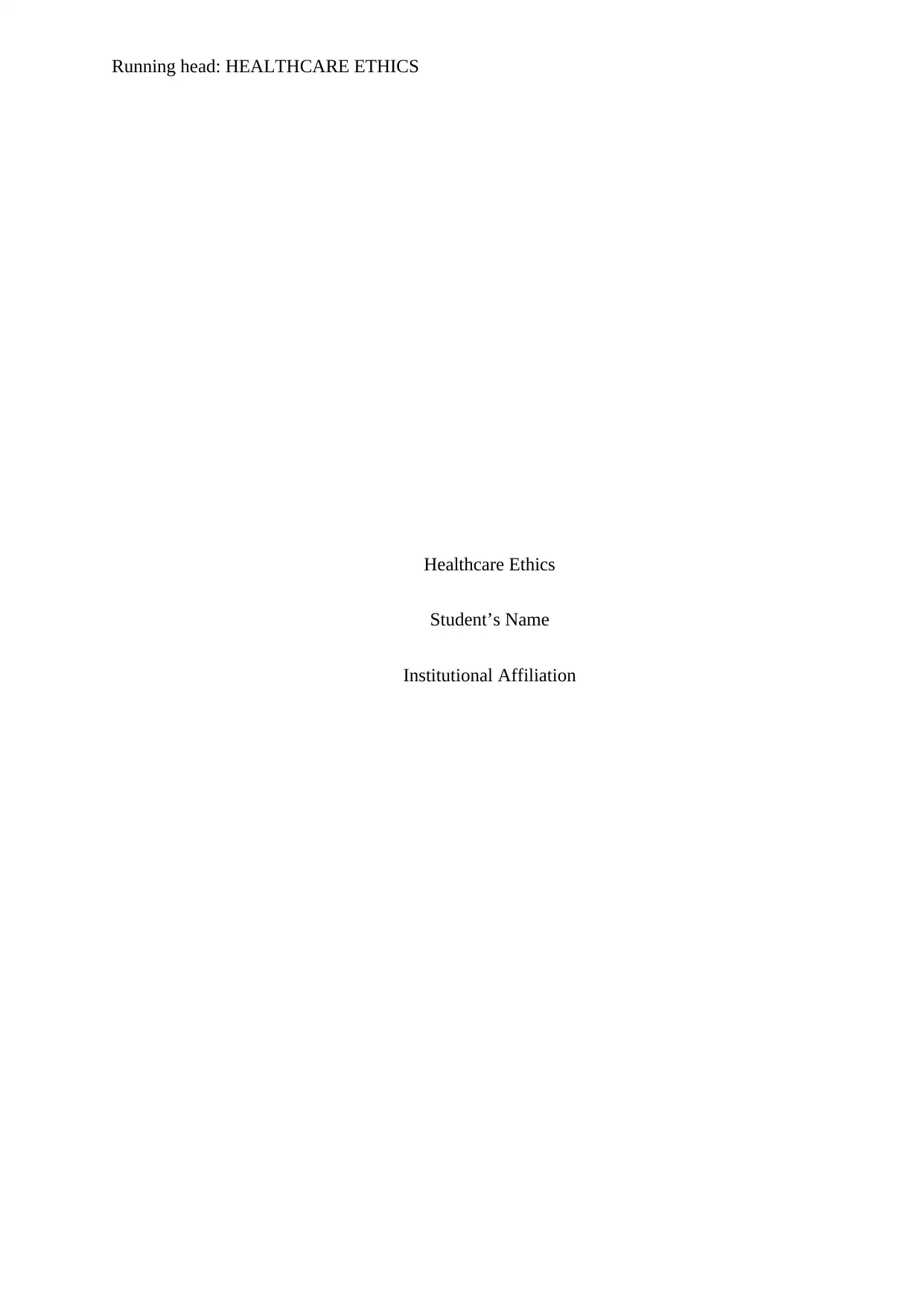
Running head: HEALTHCARE ETHICS
Healthcare Ethics
Student’s Name
Institutional Affiliation
Healthcare Ethics
Student’s Name
Institutional Affiliation
Paraphrase This Document
Need a fresh take? Get an instant paraphrase of this document with our AI Paraphraser
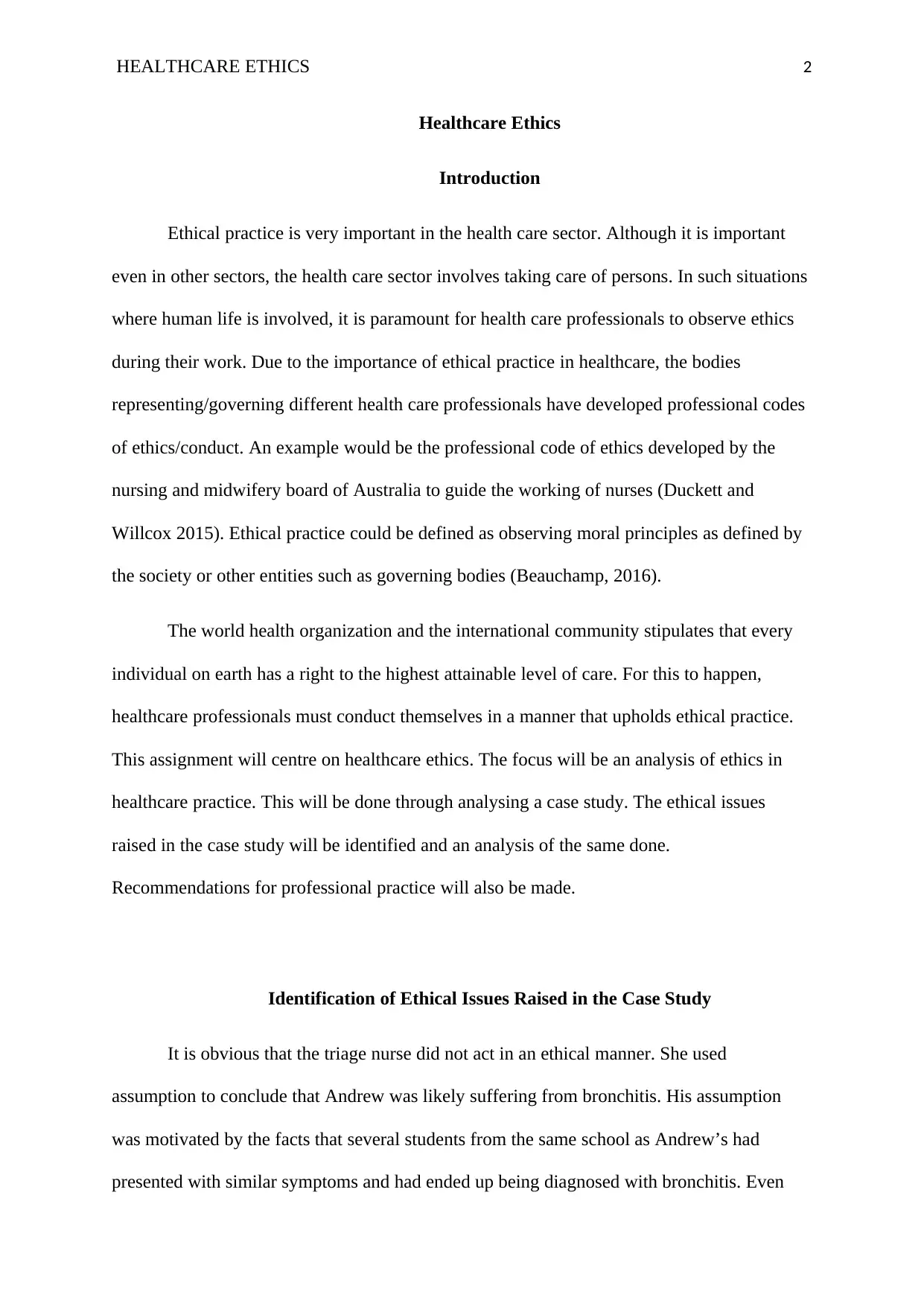
HEALTHCARE ETHICS 2
Healthcare Ethics
Introduction
Ethical practice is very important in the health care sector. Although it is important
even in other sectors, the health care sector involves taking care of persons. In such situations
where human life is involved, it is paramount for health care professionals to observe ethics
during their work. Due to the importance of ethical practice in healthcare, the bodies
representing/governing different health care professionals have developed professional codes
of ethics/conduct. An example would be the professional code of ethics developed by the
nursing and midwifery board of Australia to guide the working of nurses (Duckett and
Willcox 2015). Ethical practice could be defined as observing moral principles as defined by
the society or other entities such as governing bodies (Beauchamp, 2016).
The world health organization and the international community stipulates that every
individual on earth has a right to the highest attainable level of care. For this to happen,
healthcare professionals must conduct themselves in a manner that upholds ethical practice.
This assignment will centre on healthcare ethics. The focus will be an analysis of ethics in
healthcare practice. This will be done through analysing a case study. The ethical issues
raised in the case study will be identified and an analysis of the same done.
Recommendations for professional practice will also be made.
Identification of Ethical Issues Raised in the Case Study
It is obvious that the triage nurse did not act in an ethical manner. She used
assumption to conclude that Andrew was likely suffering from bronchitis. His assumption
was motivated by the facts that several students from the same school as Andrew’s had
presented with similar symptoms and had ended up being diagnosed with bronchitis. Even
Healthcare Ethics
Introduction
Ethical practice is very important in the health care sector. Although it is important
even in other sectors, the health care sector involves taking care of persons. In such situations
where human life is involved, it is paramount for health care professionals to observe ethics
during their work. Due to the importance of ethical practice in healthcare, the bodies
representing/governing different health care professionals have developed professional codes
of ethics/conduct. An example would be the professional code of ethics developed by the
nursing and midwifery board of Australia to guide the working of nurses (Duckett and
Willcox 2015). Ethical practice could be defined as observing moral principles as defined by
the society or other entities such as governing bodies (Beauchamp, 2016).
The world health organization and the international community stipulates that every
individual on earth has a right to the highest attainable level of care. For this to happen,
healthcare professionals must conduct themselves in a manner that upholds ethical practice.
This assignment will centre on healthcare ethics. The focus will be an analysis of ethics in
healthcare practice. This will be done through analysing a case study. The ethical issues
raised in the case study will be identified and an analysis of the same done.
Recommendations for professional practice will also be made.
Identification of Ethical Issues Raised in the Case Study
It is obvious that the triage nurse did not act in an ethical manner. She used
assumption to conclude that Andrew was likely suffering from bronchitis. His assumption
was motivated by the facts that several students from the same school as Andrew’s had
presented with similar symptoms and had ended up being diagnosed with bronchitis. Even
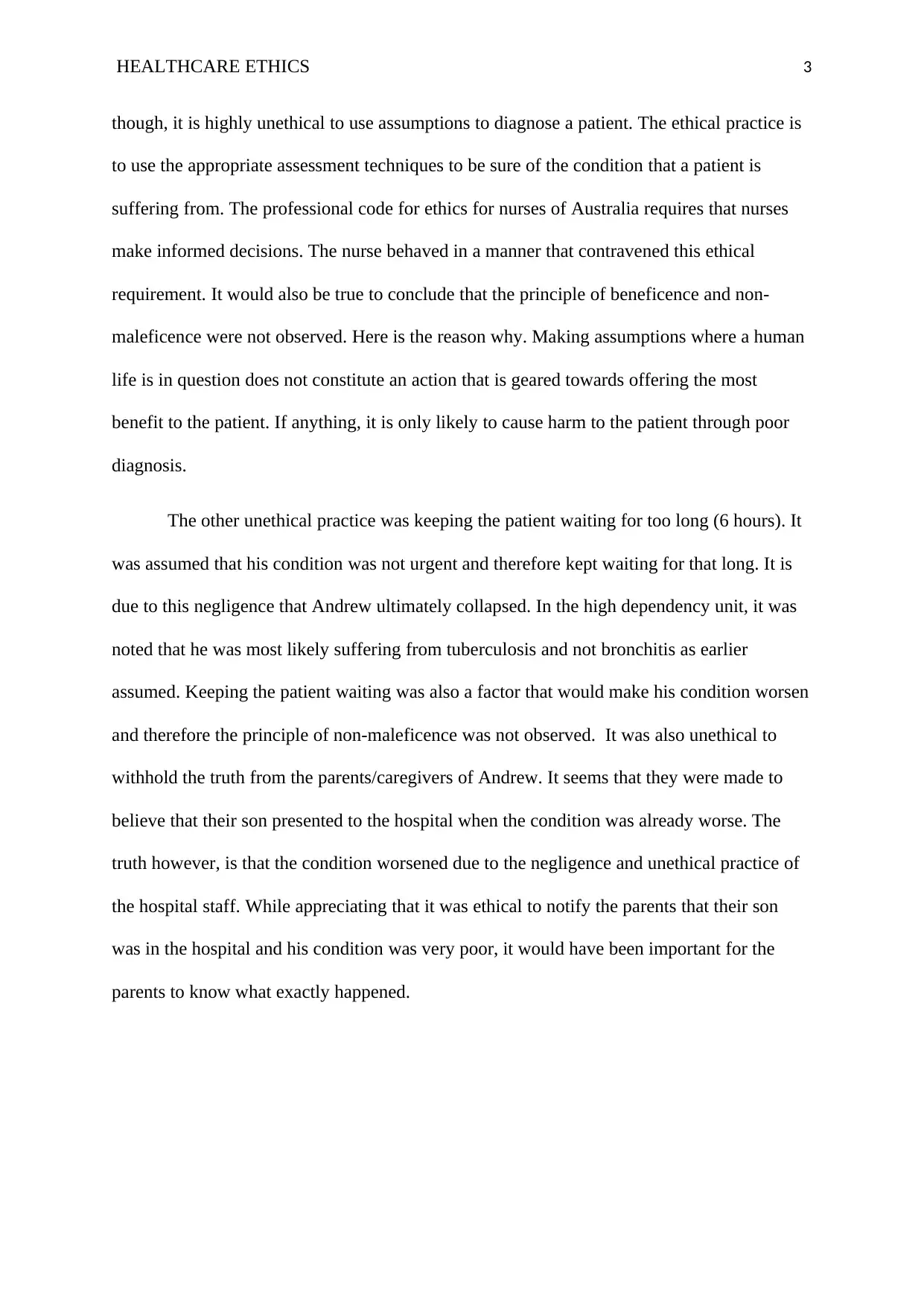
HEALTHCARE ETHICS 3
though, it is highly unethical to use assumptions to diagnose a patient. The ethical practice is
to use the appropriate assessment techniques to be sure of the condition that a patient is
suffering from. The professional code for ethics for nurses of Australia requires that nurses
make informed decisions. The nurse behaved in a manner that contravened this ethical
requirement. It would also be true to conclude that the principle of beneficence and non-
maleficence were not observed. Here is the reason why. Making assumptions where a human
life is in question does not constitute an action that is geared towards offering the most
benefit to the patient. If anything, it is only likely to cause harm to the patient through poor
diagnosis.
The other unethical practice was keeping the patient waiting for too long (6 hours). It
was assumed that his condition was not urgent and therefore kept waiting for that long. It is
due to this negligence that Andrew ultimately collapsed. In the high dependency unit, it was
noted that he was most likely suffering from tuberculosis and not bronchitis as earlier
assumed. Keeping the patient waiting was also a factor that would make his condition worsen
and therefore the principle of non-maleficence was not observed. It was also unethical to
withhold the truth from the parents/caregivers of Andrew. It seems that they were made to
believe that their son presented to the hospital when the condition was already worse. The
truth however, is that the condition worsened due to the negligence and unethical practice of
the hospital staff. While appreciating that it was ethical to notify the parents that their son
was in the hospital and his condition was very poor, it would have been important for the
parents to know what exactly happened.
though, it is highly unethical to use assumptions to diagnose a patient. The ethical practice is
to use the appropriate assessment techniques to be sure of the condition that a patient is
suffering from. The professional code for ethics for nurses of Australia requires that nurses
make informed decisions. The nurse behaved in a manner that contravened this ethical
requirement. It would also be true to conclude that the principle of beneficence and non-
maleficence were not observed. Here is the reason why. Making assumptions where a human
life is in question does not constitute an action that is geared towards offering the most
benefit to the patient. If anything, it is only likely to cause harm to the patient through poor
diagnosis.
The other unethical practice was keeping the patient waiting for too long (6 hours). It
was assumed that his condition was not urgent and therefore kept waiting for that long. It is
due to this negligence that Andrew ultimately collapsed. In the high dependency unit, it was
noted that he was most likely suffering from tuberculosis and not bronchitis as earlier
assumed. Keeping the patient waiting was also a factor that would make his condition worsen
and therefore the principle of non-maleficence was not observed. It was also unethical to
withhold the truth from the parents/caregivers of Andrew. It seems that they were made to
believe that their son presented to the hospital when the condition was already worse. The
truth however, is that the condition worsened due to the negligence and unethical practice of
the hospital staff. While appreciating that it was ethical to notify the parents that their son
was in the hospital and his condition was very poor, it would have been important for the
parents to know what exactly happened.
⊘ This is a preview!⊘
Do you want full access?
Subscribe today to unlock all pages.

Trusted by 1+ million students worldwide
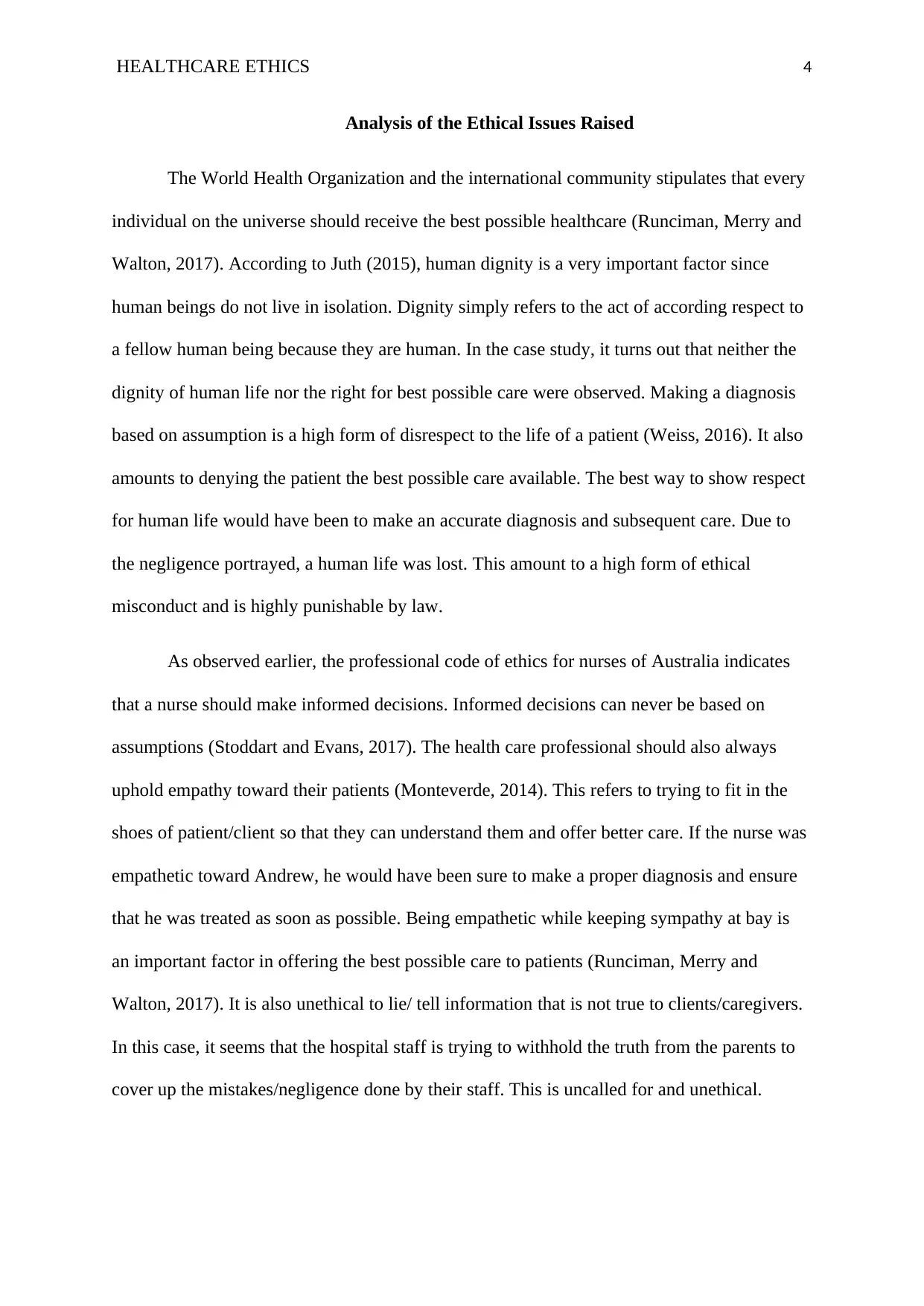
HEALTHCARE ETHICS 4
Analysis of the Ethical Issues Raised
The World Health Organization and the international community stipulates that every
individual on the universe should receive the best possible healthcare (Runciman, Merry and
Walton, 2017). According to Juth (2015), human dignity is a very important factor since
human beings do not live in isolation. Dignity simply refers to the act of according respect to
a fellow human being because they are human. In the case study, it turns out that neither the
dignity of human life nor the right for best possible care were observed. Making a diagnosis
based on assumption is a high form of disrespect to the life of a patient (Weiss, 2016). It also
amounts to denying the patient the best possible care available. The best way to show respect
for human life would have been to make an accurate diagnosis and subsequent care. Due to
the negligence portrayed, a human life was lost. This amount to a high form of ethical
misconduct and is highly punishable by law.
As observed earlier, the professional code of ethics for nurses of Australia indicates
that a nurse should make informed decisions. Informed decisions can never be based on
assumptions (Stoddart and Evans, 2017). The health care professional should also always
uphold empathy toward their patients (Monteverde, 2014). This refers to trying to fit in the
shoes of patient/client so that they can understand them and offer better care. If the nurse was
empathetic toward Andrew, he would have been sure to make a proper diagnosis and ensure
that he was treated as soon as possible. Being empathetic while keeping sympathy at bay is
an important factor in offering the best possible care to patients (Runciman, Merry and
Walton, 2017). It is also unethical to lie/ tell information that is not true to clients/caregivers.
In this case, it seems that the hospital staff is trying to withhold the truth from the parents to
cover up the mistakes/negligence done by their staff. This is uncalled for and unethical.
Analysis of the Ethical Issues Raised
The World Health Organization and the international community stipulates that every
individual on the universe should receive the best possible healthcare (Runciman, Merry and
Walton, 2017). According to Juth (2015), human dignity is a very important factor since
human beings do not live in isolation. Dignity simply refers to the act of according respect to
a fellow human being because they are human. In the case study, it turns out that neither the
dignity of human life nor the right for best possible care were observed. Making a diagnosis
based on assumption is a high form of disrespect to the life of a patient (Weiss, 2016). It also
amounts to denying the patient the best possible care available. The best way to show respect
for human life would have been to make an accurate diagnosis and subsequent care. Due to
the negligence portrayed, a human life was lost. This amount to a high form of ethical
misconduct and is highly punishable by law.
As observed earlier, the professional code of ethics for nurses of Australia indicates
that a nurse should make informed decisions. Informed decisions can never be based on
assumptions (Stoddart and Evans, 2017). The health care professional should also always
uphold empathy toward their patients (Monteverde, 2014). This refers to trying to fit in the
shoes of patient/client so that they can understand them and offer better care. If the nurse was
empathetic toward Andrew, he would have been sure to make a proper diagnosis and ensure
that he was treated as soon as possible. Being empathetic while keeping sympathy at bay is
an important factor in offering the best possible care to patients (Runciman, Merry and
Walton, 2017). It is also unethical to lie/ tell information that is not true to clients/caregivers.
In this case, it seems that the hospital staff is trying to withhold the truth from the parents to
cover up the mistakes/negligence done by their staff. This is uncalled for and unethical.
Paraphrase This Document
Need a fresh take? Get an instant paraphrase of this document with our AI Paraphraser
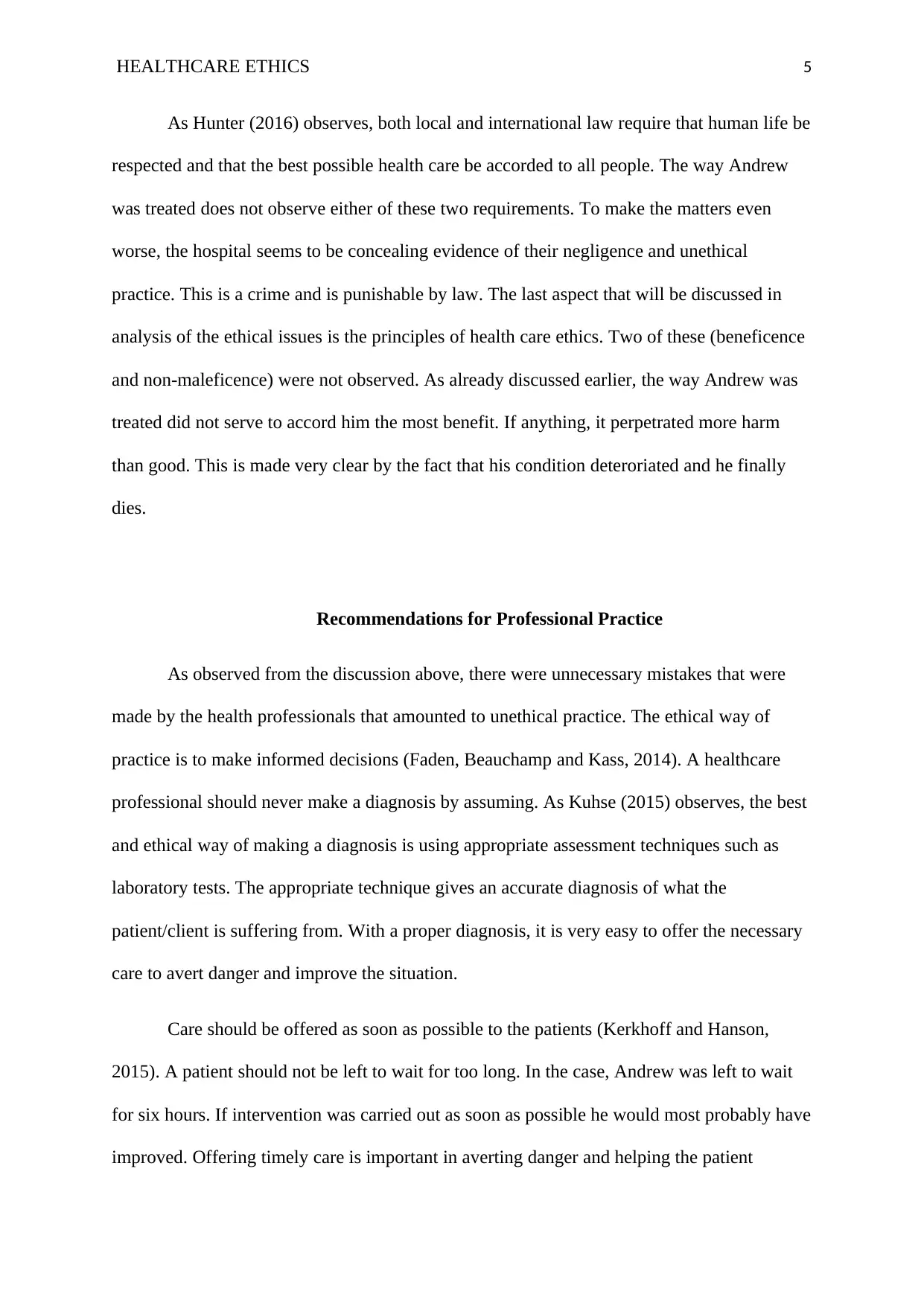
HEALTHCARE ETHICS 5
As Hunter (2016) observes, both local and international law require that human life be
respected and that the best possible health care be accorded to all people. The way Andrew
was treated does not observe either of these two requirements. To make the matters even
worse, the hospital seems to be concealing evidence of their negligence and unethical
practice. This is a crime and is punishable by law. The last aspect that will be discussed in
analysis of the ethical issues is the principles of health care ethics. Two of these (beneficence
and non-maleficence) were not observed. As already discussed earlier, the way Andrew was
treated did not serve to accord him the most benefit. If anything, it perpetrated more harm
than good. This is made very clear by the fact that his condition deteroriated and he finally
dies.
Recommendations for Professional Practice
As observed from the discussion above, there were unnecessary mistakes that were
made by the health professionals that amounted to unethical practice. The ethical way of
practice is to make informed decisions (Faden, Beauchamp and Kass, 2014). A healthcare
professional should never make a diagnosis by assuming. As Kuhse (2015) observes, the best
and ethical way of making a diagnosis is using appropriate assessment techniques such as
laboratory tests. The appropriate technique gives an accurate diagnosis of what the
patient/client is suffering from. With a proper diagnosis, it is very easy to offer the necessary
care to avert danger and improve the situation.
Care should be offered as soon as possible to the patients (Kerkhoff and Hanson,
2015). A patient should not be left to wait for too long. In the case, Andrew was left to wait
for six hours. If intervention was carried out as soon as possible he would most probably have
improved. Offering timely care is important in averting danger and helping the patient
As Hunter (2016) observes, both local and international law require that human life be
respected and that the best possible health care be accorded to all people. The way Andrew
was treated does not observe either of these two requirements. To make the matters even
worse, the hospital seems to be concealing evidence of their negligence and unethical
practice. This is a crime and is punishable by law. The last aspect that will be discussed in
analysis of the ethical issues is the principles of health care ethics. Two of these (beneficence
and non-maleficence) were not observed. As already discussed earlier, the way Andrew was
treated did not serve to accord him the most benefit. If anything, it perpetrated more harm
than good. This is made very clear by the fact that his condition deteroriated and he finally
dies.
Recommendations for Professional Practice
As observed from the discussion above, there were unnecessary mistakes that were
made by the health professionals that amounted to unethical practice. The ethical way of
practice is to make informed decisions (Faden, Beauchamp and Kass, 2014). A healthcare
professional should never make a diagnosis by assuming. As Kuhse (2015) observes, the best
and ethical way of making a diagnosis is using appropriate assessment techniques such as
laboratory tests. The appropriate technique gives an accurate diagnosis of what the
patient/client is suffering from. With a proper diagnosis, it is very easy to offer the necessary
care to avert danger and improve the situation.
Care should be offered as soon as possible to the patients (Kerkhoff and Hanson,
2015). A patient should not be left to wait for too long. In the case, Andrew was left to wait
for six hours. If intervention was carried out as soon as possible he would most probably have
improved. Offering timely care is important in averting danger and helping the patient
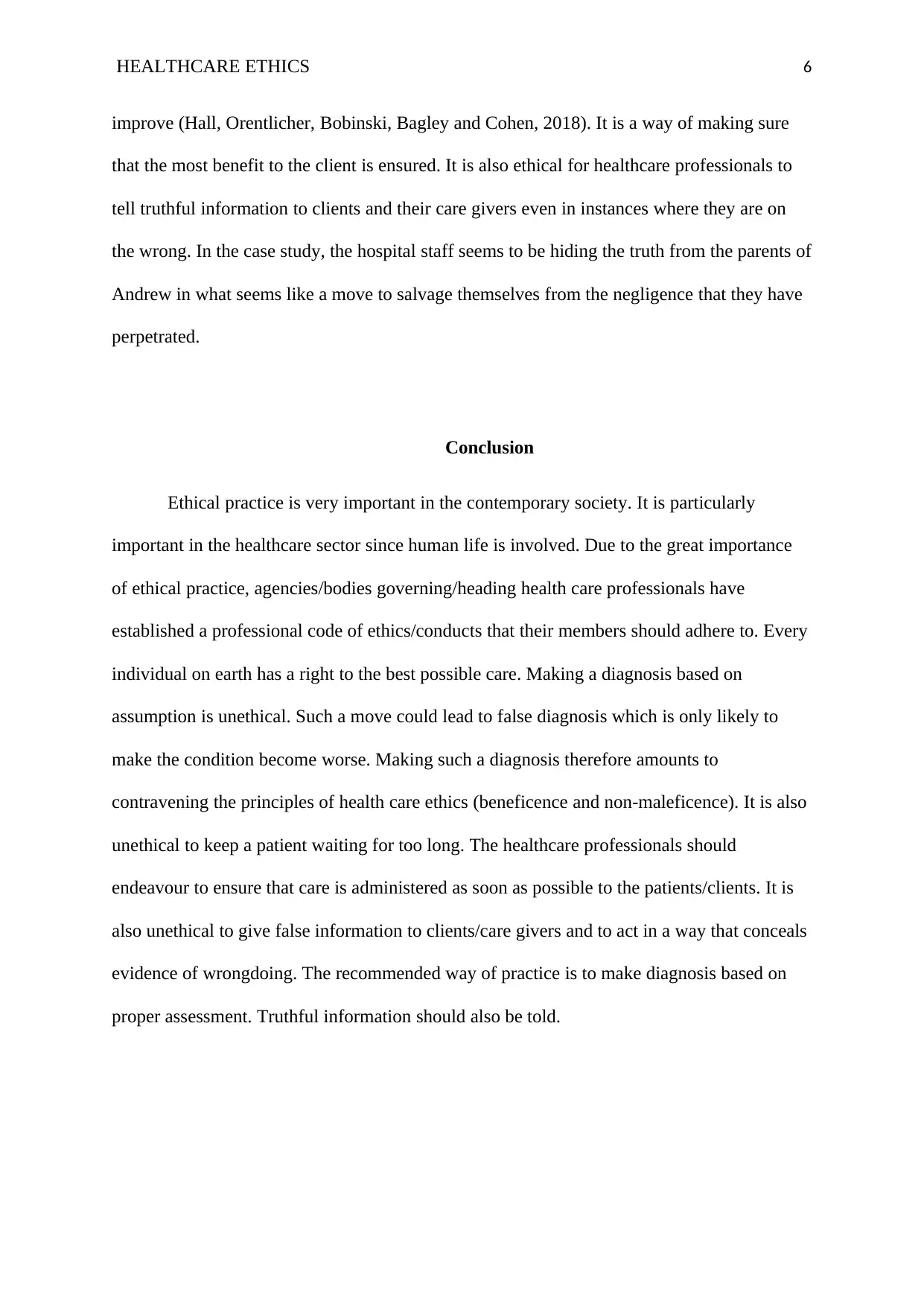
HEALTHCARE ETHICS 6
improve (Hall, Orentlicher, Bobinski, Bagley and Cohen, 2018). It is a way of making sure
that the most benefit to the client is ensured. It is also ethical for healthcare professionals to
tell truthful information to clients and their care givers even in instances where they are on
the wrong. In the case study, the hospital staff seems to be hiding the truth from the parents of
Andrew in what seems like a move to salvage themselves from the negligence that they have
perpetrated.
Conclusion
Ethical practice is very important in the contemporary society. It is particularly
important in the healthcare sector since human life is involved. Due to the great importance
of ethical practice, agencies/bodies governing/heading health care professionals have
established a professional code of ethics/conducts that their members should adhere to. Every
individual on earth has a right to the best possible care. Making a diagnosis based on
assumption is unethical. Such a move could lead to false diagnosis which is only likely to
make the condition become worse. Making such a diagnosis therefore amounts to
contravening the principles of health care ethics (beneficence and non-maleficence). It is also
unethical to keep a patient waiting for too long. The healthcare professionals should
endeavour to ensure that care is administered as soon as possible to the patients/clients. It is
also unethical to give false information to clients/care givers and to act in a way that conceals
evidence of wrongdoing. The recommended way of practice is to make diagnosis based on
proper assessment. Truthful information should also be told.
improve (Hall, Orentlicher, Bobinski, Bagley and Cohen, 2018). It is a way of making sure
that the most benefit to the client is ensured. It is also ethical for healthcare professionals to
tell truthful information to clients and their care givers even in instances where they are on
the wrong. In the case study, the hospital staff seems to be hiding the truth from the parents of
Andrew in what seems like a move to salvage themselves from the negligence that they have
perpetrated.
Conclusion
Ethical practice is very important in the contemporary society. It is particularly
important in the healthcare sector since human life is involved. Due to the great importance
of ethical practice, agencies/bodies governing/heading health care professionals have
established a professional code of ethics/conducts that their members should adhere to. Every
individual on earth has a right to the best possible care. Making a diagnosis based on
assumption is unethical. Such a move could lead to false diagnosis which is only likely to
make the condition become worse. Making such a diagnosis therefore amounts to
contravening the principles of health care ethics (beneficence and non-maleficence). It is also
unethical to keep a patient waiting for too long. The healthcare professionals should
endeavour to ensure that care is administered as soon as possible to the patients/clients. It is
also unethical to give false information to clients/care givers and to act in a way that conceals
evidence of wrongdoing. The recommended way of practice is to make diagnosis based on
proper assessment. Truthful information should also be told.
⊘ This is a preview!⊘
Do you want full access?
Subscribe today to unlock all pages.

Trusted by 1+ million students worldwide
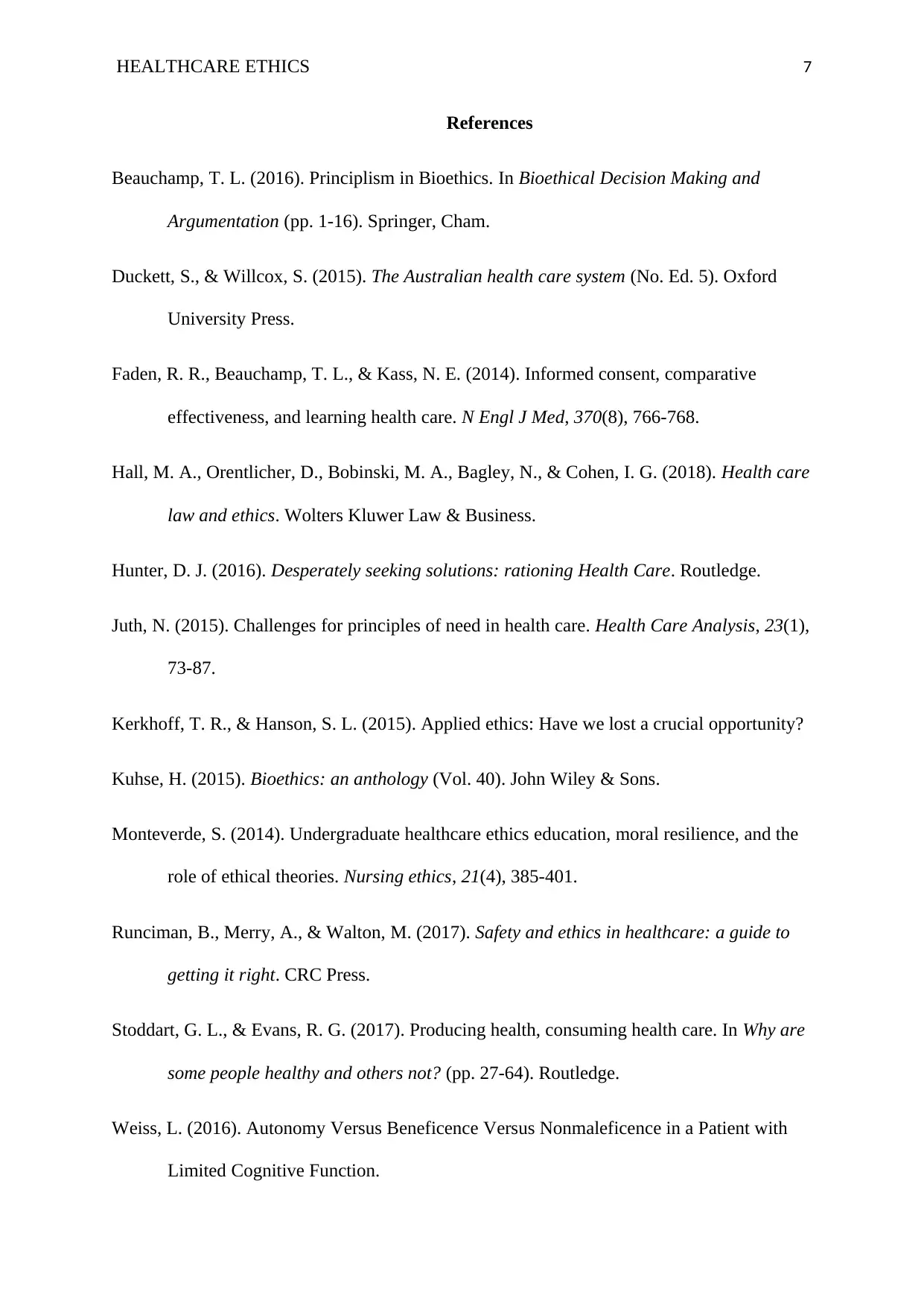
HEALTHCARE ETHICS 7
References
Beauchamp, T. L. (2016). Principlism in Bioethics. In Bioethical Decision Making and
Argumentation (pp. 1-16). Springer, Cham.
Duckett, S., & Willcox, S. (2015). The Australian health care system (No. Ed. 5). Oxford
University Press.
Faden, R. R., Beauchamp, T. L., & Kass, N. E. (2014). Informed consent, comparative
effectiveness, and learning health care. N Engl J Med, 370(8), 766-768.
Hall, M. A., Orentlicher, D., Bobinski, M. A., Bagley, N., & Cohen, I. G. (2018). Health care
law and ethics. Wolters Kluwer Law & Business.
Hunter, D. J. (2016). Desperately seeking solutions: rationing Health Care. Routledge.
Juth, N. (2015). Challenges for principles of need in health care. Health Care Analysis, 23(1),
73-87.
Kerkhoff, T. R., & Hanson, S. L. (2015). Applied ethics: Have we lost a crucial opportunity?
Kuhse, H. (2015). Bioethics: an anthology (Vol. 40). John Wiley & Sons.
Monteverde, S. (2014). Undergraduate healthcare ethics education, moral resilience, and the
role of ethical theories. Nursing ethics, 21(4), 385-401.
Runciman, B., Merry, A., & Walton, M. (2017). Safety and ethics in healthcare: a guide to
getting it right. CRC Press.
Stoddart, G. L., & Evans, R. G. (2017). Producing health, consuming health care. In Why are
some people healthy and others not? (pp. 27-64). Routledge.
Weiss, L. (2016). Autonomy Versus Beneficence Versus Nonmaleficence in a Patient with
Limited Cognitive Function.
References
Beauchamp, T. L. (2016). Principlism in Bioethics. In Bioethical Decision Making and
Argumentation (pp. 1-16). Springer, Cham.
Duckett, S., & Willcox, S. (2015). The Australian health care system (No. Ed. 5). Oxford
University Press.
Faden, R. R., Beauchamp, T. L., & Kass, N. E. (2014). Informed consent, comparative
effectiveness, and learning health care. N Engl J Med, 370(8), 766-768.
Hall, M. A., Orentlicher, D., Bobinski, M. A., Bagley, N., & Cohen, I. G. (2018). Health care
law and ethics. Wolters Kluwer Law & Business.
Hunter, D. J. (2016). Desperately seeking solutions: rationing Health Care. Routledge.
Juth, N. (2015). Challenges for principles of need in health care. Health Care Analysis, 23(1),
73-87.
Kerkhoff, T. R., & Hanson, S. L. (2015). Applied ethics: Have we lost a crucial opportunity?
Kuhse, H. (2015). Bioethics: an anthology (Vol. 40). John Wiley & Sons.
Monteverde, S. (2014). Undergraduate healthcare ethics education, moral resilience, and the
role of ethical theories. Nursing ethics, 21(4), 385-401.
Runciman, B., Merry, A., & Walton, M. (2017). Safety and ethics in healthcare: a guide to
getting it right. CRC Press.
Stoddart, G. L., & Evans, R. G. (2017). Producing health, consuming health care. In Why are
some people healthy and others not? (pp. 27-64). Routledge.
Weiss, L. (2016). Autonomy Versus Beneficence Versus Nonmaleficence in a Patient with
Limited Cognitive Function.
1 out of 7
Related Documents
Your All-in-One AI-Powered Toolkit for Academic Success.
+13062052269
info@desklib.com
Available 24*7 on WhatsApp / Email
![[object Object]](/_next/static/media/star-bottom.7253800d.svg)
Unlock your academic potential
Copyright © 2020–2026 A2Z Services. All Rights Reserved. Developed and managed by ZUCOL.





